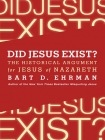Did Jesus Exist? - The Historical Argument for Jesus of Nazareth by Bart Ehrman (ebook reader browser .TXT) 📗

- Author: Bart Ehrman
Book online «Did Jesus Exist? - The Historical Argument for Jesus of Nazareth by Bart Ehrman (ebook reader browser .TXT) 📗». Author Bart Ehrman
Paul, as we will see in this chapter, is highly relevant for establishing the historical existence of Jesus, as are many other sources outside the Gospels. This chapter will be devoted to this evidence. We will begin our considerations with later sources and then move to the testimony of our earliest surviving Christian author, Paul.
Later Sources from Outside the New Testament
AT THE OUTSET I should emphatically state the obvious. Every single source that mentions Jesus up until the eighteenth century assumed that he actually existed. That is true no matter what period you choose to examine: the Reformation, the Renaissance, the Middle Ages, Late Antiquity, and before. It is true of every source from our earliest periods, the fourth century, the third century, the second century, and the first century. It is true of every author of every kind, Christian, Jewish, or pagan. Most striking, it is true not just of those who came to believe in Jesus but also of nonbelievers in general and of the opponents of Christianity in particular. Many scholars have found this significant. Not even the Jewish and pagan antagonists who attacked Christianity and Jesus himself entertained the thought that he never existed. This is quite clear from reading the writings of the Christian apologists, starting with such authors as the anonymous writer of the Letter to Diognetus and the more famous writers Justin Martyr, Tertullian, and Origen (all from the second and early third centuries), all of whom defend Jesus against a number of charges, many of them scandalous. But they do not drop one hint that anyone claimed he did not exist. The same is clear from the fragments of writings that still survive from the opponents of the Christians, such as the Jew Trypho, discussed by Justin, or the pagan philosopher Celsus, cited extensively by Origen. The idea that Jesus did not exist is a modern notion. It has no ancient precedents. It was made up in the eighteenth century. One might well call it a modern myth, the myth of the mythical Jesus.
We have already seen that at least seven Gospel accounts of Jesus, all of them entirely or partially independent of one another, survived from within a century of the traditional date of his death. These seven are based on numerous previously existent written sources and on an enormous number of oral traditions about him that can be dated back to Aramaic sources of Palestine, almost certainly from the 30s of the Common Era. If we stay within those same time restrictions, what can we say about sources attested from outside the Gospels?
Non-Christian Sources
We should first return to the writings of Josephus and Tacitus. Tacitus almost certainly had information at his disposal about Jesus, for example, that he was crucified in Judea during the governorship of Pontius Pilate. Josephus appears as well to have known about Jesus, both some major aspects of his life and his death under Pontius Pilate. What I did not stress earlier but need to point out now is that there is absolutely nothing to suggest that the pagan Tacitus or the Jewish Josephus acquired their information about Jesus by reading the Gospels. They heard information about him. That means the information they gave predated their writings. Their informants were no doubt Christians, or—even more likely—(non-Christian) people they knew who themselves had heard stories about Jesus from Christians. It is impossible to know whether these Christians had been influenced by the sources we have already discussed, but it is completely possible that they themselves had simply heard stories about Jesus. Indirectly, then, Tacitus and (possibly) Josephus provide independent attestation to Jesus’s existence from outside the Gospels although, as I stated earlier, in doing so they do not give us information that is unavailable in our other sources.
Christian Sources
There are also important independent sources among Christian writers from about the same time as Tacitus, writers who convey information about the historical Jesus and certainly attest to his existence. They do so without deriving all, or even most, of their information from the Gospel sources. Three of these are especially significant.
Papias
Papias was a church father of the early second century whose writings survive for us only in fragments, as they are quoted by later Christian authors.1 From these later sources we learn that Papias had written a five-volume work called Expositions of the Sayings of the Lord; this (very?) large book is normally thought to have been written around 120–130 CE. We do not know for certain why Christian scribes did not copy the book and so preserve it for posterity. But it appears that some of the views that Papias advanced were seen to be offensive or at least naive. The great church historian of the fourth century, Eusebius, dismissed Papias by saying that he was “a man of very small intelligence” (Church History 3.39).
Intelligent or not, Papias is an important source for establishing the historical existence of Jesus. He had read some Gospels although there is no reason to think that he knew the ones that made it into the New Testament, as I will show in a moment. But more important, he had other access to the sayings of Jesus. He was personally acquainted with people who had known either the apostles themselves or their companions. The following quotation of his work, from Eusebius, makes the





Comments (0)